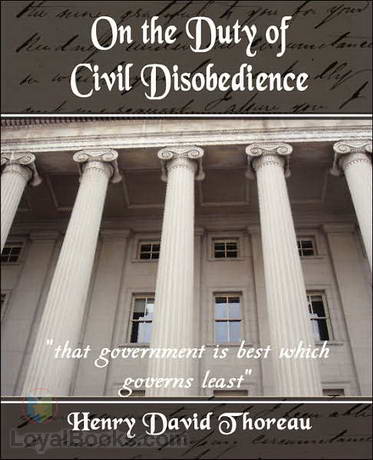by Henry David Thoreau
Thoreau considers the responsibility of citizens and individuals to act when government is causing injustice.
Appropriate... well for anyone who is interested, I guess!
Read for my Book Colloquia
Essay
Printed from a public domain website

I often look back at the mid-1800s and think of it as America’s Eden. Revolution settled, land, health, and personal liberties abounding in the land. I know, this perception has left the territory of idealism and entered the land of fiction where disadvantaged individuals have faded into the some romantic-haze. But leave it to Thoreau to bring me to reality. Turns out, even the privileged had plenty to complain about and people were already terribly dissatisfied with their government.
Thoreau makes an impassioned case for refusing to pay taxes to a government which is actively engaged in wrong-doing, in his time slavery and The Mexican-American War. I find his argument appealing in its clarity and unsullied approach to justice - I like clean lines. But I also think he has greatly over-simplified the impact and difficulty, if not impossibility, of his proscribed course. He’s also a precocious Post-Modernist, but that’s another discussion for another day.
Lots of quotes:
This American government--what is it but a tradition, though a recent one, endeavoring to transmit itself unimpaired to posterity, but each instant losing some of its
integrity?
Let every man make known what kind of government would command his respect, and that will be one step toward obtaining it.
It is not desirable to cultivate a respect for the law, so much as for the right. The only
obligation which I have a right to assume is to do at any time what I think right.
Others--as most legislators, politicians, lawyers, ministers, and office-holders--serve the state chiefly with their heads; and, as they rarely make any moral distinctions, they are as likely to serve the devil, without _intending_ it, as God.
It is not so important that many should be good as you, as that there be some absolute
goodness somewhere; for that will leaven the whole lump.
They hesitate, and they regret, and sometimes they petition; but they do nothing in
earnest and with effect. They will wait, well disposed, for other to remedy the evil, that they may no longer have it to regret.
Even _voting for the right_ is _doing_ nothing for it. It is only expressing to men feebly your desire that it should prevail.
It is not a man's duty, as a matter of course, to devote himself to the eradication of any, even to most enormous wrong; he may still properly have other concerns to engage him; but it is his duty, at least, to wash his hands of it, and, if he gives it no thought longer, not to give it practically his support. If I devote myself to other pursuits and contemplations, I must first see, at least, that I do not pursue them sitting upon another man's shoulders.
Action from principle, the perception and the performance of right, changes things and relations; it is essentially revolutionary
I know this well, that if one thousand, if one hundred, if ten men whom I
could name--if ten _honest_ men only--ay, if _one_ HONEST man, in this State of Massachusetts, _ceasing to hold slaves_, were actually to withdraw from this co-partnership, and be locked up in the county jail therefor, it would be the abolition of slavery in America. For it matters not how small the beginning may seem to be: what is once well done is done forever. But we love better to talk about it: that we say is our mission. Reform keeps many scores of newspapers in its service, but not one man.
I did not for a moment feel confined, and the walls seemed a great waste of stone and mortar. I felt as if I alone of all my townsmen had paid my tax.
There will never be a really free and enlightened State until the State comes to recognize the individual as a higher and independent power, from which all its own power and authority are derived, and treats him accordingly.
Just have to say that this post is incredibly well written! Nice!
ReplyDelete